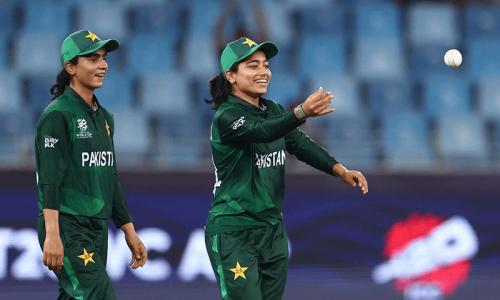LAHORE: The Afghan refugees in Punjab are hopeful of being registered after the National Database and Registration Authority (Nadra) opened its centres on Wednesday.
In all there are 32 Afghan registration centres working for the same objective, including one in Islamabad, 11 in KP (52pc of the refugees stay there), one in Karachi and 16 in Balochistan.
According to statistics provided by the UNHCR, around 1.3 million Afghan refugees are currently in Pakistan -- 10pc of them in Punjab. In Lahore the number of registered refugees is 8,000 to 10,000. The alarming situation is that the number of unregistered refugees is almost equal to the number of registered ones.
Mudassir Javed, vice chairman of SHARP (Society for Human Rights and Prisoners’ Aid) – working under the UNHCR – says there are about 1.6 million unregistered Afghan refugees in Pakistan.
According to a Nadra official, the ‘Afghan Citizen Card’ process will be operating till the next six months. “The refugees will be provided with cards for temporary residence,” he said. “The last registration closed down in 2011, however modifications continued even after that.”
As many of the refugees do not read newspapers, they may have missed advertisements for the call to register. But the government has also been announcing this in radio ads – a medium more accessible to them. Besides this in any case, the message is given to the community elders by field officers of the UNHCR and SHARP who then pass it on through their community network.
Even though many will be registered soon, the change they will face will be minimal. Their new registered status will be a major security aspect for them, but other than this, even card holders, most of whom are blue-collar workers, live in the most abysmal conditions.
A cluster of 10 or 15 families that live near Multan Road area are an example of this. They share a basic brick compound. Outside there is a broken sewage pipeline. Inside there are cattle tied in the same space, while garbage for recycling is piled high in one of the corners. Some of the Afghan men now work in the garbage business, recycling paper. But a lack of cleanliness has led to illnesses such as hepatitis, especially among women and children.
Haji Sher Mohammad is one of the luckier ones. He fled to Pakistan during the 1979 war and has been registered. This means he can gain access to health services, and education for his children, but he still suffers from not being able to open a bank account or to even own a piece of land. “We are only allowed to rent a place,” he says.
“For those who are unregistered and living with me, they are people I know, and they can be guaranteed by me (a card holder) but of course this is inconvenient.”
Otherwise even five-year-old children need to be registered unlike the 18 years benchmark for a regular Pakistan CNIC.
The women of this community are nowhere to be seen. Sher Mohammad says they cannot speak any local language because it is their custom not to mingle with the locals. Also they are more or less cut off from outside society. A lack of education aggravates the situation.
A Pushto interpreter who works with these women refugees reveals that language barriers cause problems.
“There is a high level of infant and maternal mortality rate because these women cannot communicate their medical needs in hospitals or other places,” she says. “Many times babies are born at home in unhygienic conditions. If there are complications, a lack of refugee cards may result in delayed operations, and of course there is the language issue. They are so marginalised that their issues are derived from that. At home for instance, they do not have clean water supply, or any access to a proper toilet.”
(While the Pushto-speaking Afghans are conservative, the Dari-speaking ones are considered somewhat liberal in their outlook.)
A lack of education and training in vocational skills has left the women with no economic independence. They make handicraft at home but cannot sell them. Their families are so big that it makes schooling harder.
“Which government school will enroll 250 kids?” asks one man.
But as a community they also face social stigma. Often when women go to hospitals, and have language issues, staff tend to drive them away even thinking they are from the beggar community.
In 2016 the UNHCR gave USD400 per head for repatriation from June to October after which it was reduced to USD200. But because of serious conflict, no business or employment opportunities, those who had left, had to return.
“Many had to leave their belongings to return because the situation there has driven us back,” says Sher Mohammad.
Nazik Mir laughs scornfully at the idea of any kind of peace in Afghanistan and the others join chattering in Pushto. “There is so much presence of Taliban who extort money for their operations, and Daesh who is even more dangerous. Many of us had taken money for repatriation but had to return. Who wants to do that but we have to.” Sher Mohammad says it is peaceful living in Lahore.
Hamid Latif, field officer of SHARP, says the Afghan refugees are harassed especially by police every now and then. “When there was a blast in February, police picked up every single man who looked like a Pukhtoon. In Rahim Yar Khan they even pick up women and children,” he says.
Although Pakistan has been home to Afghan refugees since 1979, despite not even being a signatory to the 1967 international refugee convention, there is no regulation policy, says Mudassar. “There should be a peaceful repatriation policy so that those leaving are not disgruntled and leave as friends.”
Meanwhile, according to a notification by the federal government issued on Feb 24, 2017, the residency status of the refugees has been extended till Dec 31, 2017. After that they too will have to reapply if another extension is not given.
Published in Dawn, August 18th, 2017












































